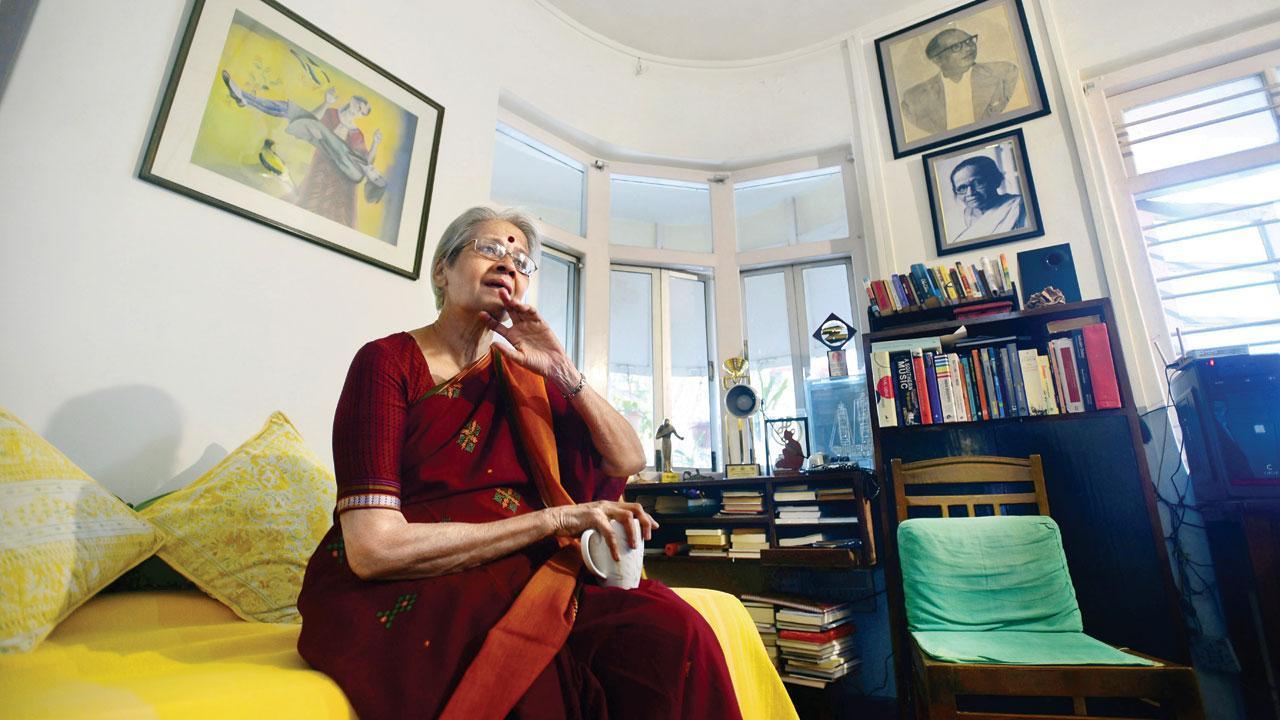Veteran writer-translator Shanta Gokhale on why Sane Guruji’s Marathi classic deserved a good English translation 85 years after it was first written and continues to be published

Writer-translator Shanta Gokhale first read Shyamchi Aai as a child, and remembers weeping copiously. Pic/Rane Ashish
As a child, when Shanta Gokhale first read social activist Sane Guruji’s autobiography, Shyamchi Aai, she “wept copiously”. “I didn’t like Shyam’s mother when she beat him when he was afraid to learn swimming. I was scared of water and I knew how that felt. I didn’t like Shyam’s father when he scolded him for not having his head shaved. When my mother asked me how I was getting along with the book, I told her what I thought. She said times were different then and the family was poor. I had to understand that,” the veteran writer-translator-critic shares, in an email interview. The impact of reading the book, she remembers, was “distinctly different from reading Heidi”—a book she loved. “Heidi was in the Swiss mountains. Shyam was next door. I suppose I realised that Heidi was about other people, and Shyam was about us,” she adds.
ADVERTISEMENT
Replete with life lessons, Guruji wrote the book when he was imprisoned in Nashik jail between 1932 and 1934. The author-protagonist locates the book in an ashram, where he shares stories about his childhood in Palgad and most importantly his relationship with his mother, to fellow residents. The stories, told over 42 nights, are like parables from a child about a mother, who taught him values of self-respect, hard work, honesty, and being a better human.
Translating the classic, Gokhale says, was always at the back of her mind. “Left to myself, I would have come to it after I had finished translating Brahmankanya, which I am doing presently. But when Penguin approached me for a translation, Shyamchi Aai leap-frogged over Brahmankanya.” She began work on the book in March 2019, and it took her about six months to edit, rewrite, correct.
Edited excerpts from the interview:
What’s the importance of this classic in Marathi literature?
I have lost the edition I read as a child. The one I have now is the 13th edition from the present publisher, who bought the rights for it in 2011. This means Shyamchi Aai is still selling 85 years after it was first published. Jnanpith award winner Bhalchandra Nemade lists it among the 10 Marathi classics he would urge everyone to read.
In the introduction, Jerry Pinto mentions reading a bad translation of this book. Do you think not having a great translation of the text, has done it a disservice?
Perhaps it is true that earlier translations have not been particularly good. Having read the original, I have not felt the need to read its translations. But it stands to reason that a good translation serves the original better than a bad one. However, merely having a translation out, even when it is good, does not necessarily help a book. The field is so crowded with books of every kind that each one that comes out must announce itself loudly to be noticed. Earlier not many publishers were interested in translations anyway. Today they are. That is half the battle won.
Do you have a personal favourite story in Shyamchi Aai, or one that you feel, we all need to read and understand?
My favourite is the one in which Shyam’s mother tells his father she will not live a day longer in her parents’ home. She will not mind living in a cowshed if that is all he can afford to build. But if he wants her to live at all, he must ensure she can live with self-respect. I believe there would be much less wrong-doing in the world if people valued self-respect above all else, always being mindful of the fact that self-respect is not arrogance.
While Shyamchi Aai is a tale about values, it also offers a glimpse into rural life in the Konkan. Could you share your thoughts on that?
I have spent a few short holidays in the Konkan. It is one of the most beautiful parts of the country. Sane Guruji describes Konkan’s natural beauty—its forests, rivers, waterfalls and the sea, with awe and tenderness. There are several insights here into the culture of the Konkan too, particularly of poor Brahmin families and their way of life. You can almost hear the grains being ground, buttermilk churned, rice being pounded. It is not idyllic as urban romantics would like to believe. Poverty is never that. But there is more stoicism here than self-pity.
What: Shyamchi Aai
To buy: Amazon.in
Cost: Rs 250
 Subscribe today by clicking the link and stay updated with the latest news!" Click here!
Subscribe today by clicking the link and stay updated with the latest news!" Click here!






